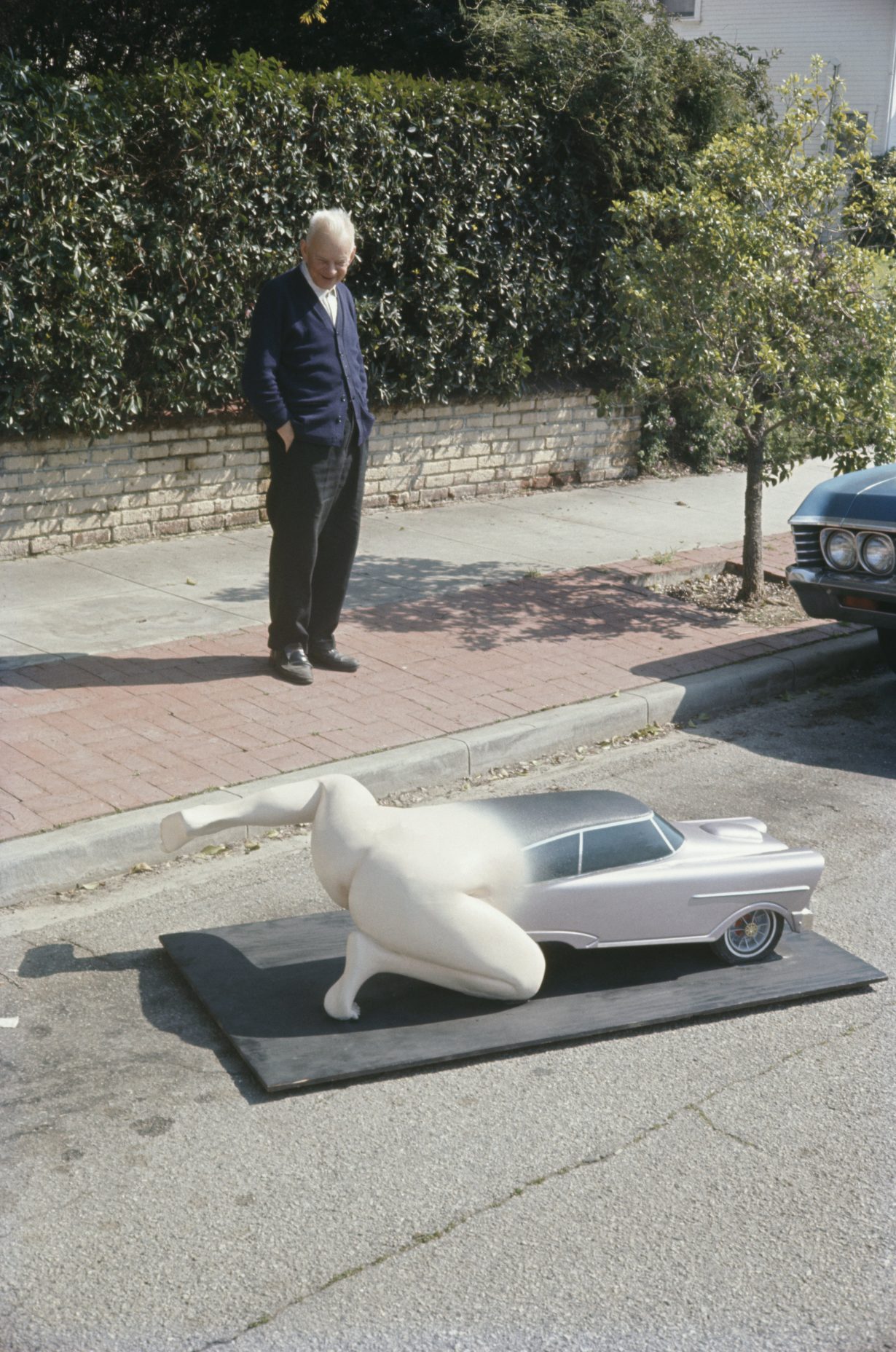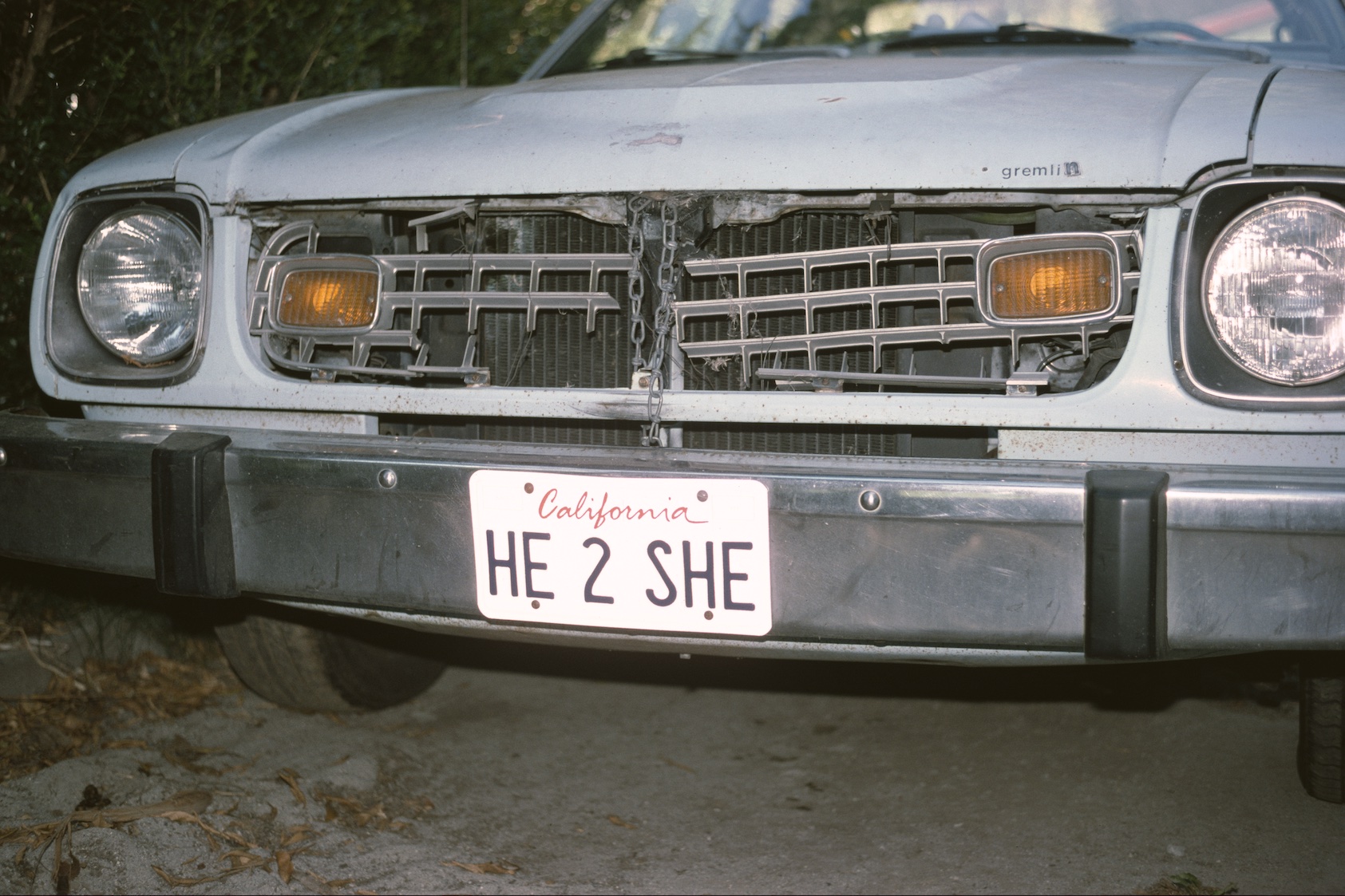Act Like You Know Me at White Columns, New York showcases the artist’s delightfully irreverent sensibility
In 1969 Pippa Garner – then Philip Garner, a student at Los Angeles’s esteemed ArtCenter – debuted her final project for a course in transportation design. Kar-Mann (Half Human Half Car) (1969) fused the front of a model Volkswagen with a naked man’s sculpted lower half. The chimeric figure had a leg lifted as if he were preparing to mark his territory; a map of Detroit, an automobile industry hub, readied itself beneath him. Garner was promptly expelled.
The delightfully irreverent sensibility, reconfiguration of human and automotive bodies, and dual eroticisation and critique of cars (and by extension, hypermasculine car culture) characterising Kar-Mann would become throughlines in Garner’s transdisciplinary art. Photographs of the sculpture – in one instance, being quizzically eyed by an elderly man on a neighbourhood stroll – are the earliest works in Act Like You Know Me, a modestly scaled but spirited survey of five decades of Garner’s photographs, drawings and ephemera.
The show arrives on the heels of another survey devoted to Garner, at Art Omi in Upstate New York, and the reprint of her Better Living Catalog (1982), which advertised such fictitious ‘absolute necessities for contemporary survival’ as a shower in a can, a proto-Tamagotchi and a blender in a backpack. Garner’s mail-order catalogue pleasurably poked fun at American DIY ingenuity while skewering the desire that capitalism manufactures for nonsensical products; it was sufficiently popular to land her an appearance on The Tonight Show in 1982. Lining a gallery wall, silver gelatin prints mimic the aesthetic conventions of straight product photography with objects set against blank backdrops; each image spotlights one of Garner’s ‘inventions’, such as shoes that physically attach dance partners to one another. A copy of Better Living Catalog is also on hand, set beneath a monitor playing clips from her interview and a 2004 stint on the reality tv show Monster Garage (2002–21).

Garner, whose work is embedded in mass media, popular culture and everyday life, has historically operated at the artworld’s peripheries despite her friendships with prominent West Coast artists also interested in the intersection of conceptual art and car culture, like Ed Ruscha and Chris Burden. Her zany inventor persona, and later her embodied exploration of gender, were often not understood to be artworks, and her mass media interventions did not fit neatly into gallery and museum contexts. The exhibition highlights her resourcefulness in transforming car and men’s magazines into alternative exhibition venues. Laid open on a table, Esquire’s November 1974 issue features a photograph of cars traversing a San Francisco freeway; a green Chevrolet drives the wrong way. To make Backwards Car (Golden Gate Bridge) (1974), a kinetic sculpture that Garner convinced Esquire to bankroll, the artist flipped around a used car’s body so the vehicle appeared to drive in reverse: a puckish inversion of automobiles’ – and perhaps consumerism’s – forward flow.
Sartorial creations on view include graphic T-shirts – a form of mass media that Garner began working with during the early 2000s – emblazoned with zinger slogans (‘Landfill: Born and Raised’) and Tie Skirt (c. 1980/81), a gender-bending skirt made of striped neckties, here limply encircling a column. For decades, Garner has approached gender and the body as ripe for remixing, reinvention and play, akin to her thinking on cars. ‘I could never get enough pussy so I built one in,’ reads an undated handwritten memo. She began taking black-market oestrogen during the mid-1980s, followed by prescribed hormones and multiple surgeries, which she considers as artistic collaborations. One of the later works on view, Un(tit)led (HE 2 SHE) (1995), is a photograph of her banged-up-car’s license plate, which reads ‘HE 2 SHE’; DMV documentation indicates that her original request for ‘SX CHANGE’ was rejected as ‘offensive or misleading’. An ongoing, open-ended project, Garner’s gender-hacking extends into her trans, genderqueer present, and a world that might finally be catching up to her.
Act Like You Know Me at White Columns, New York, 3 November – 16 December
